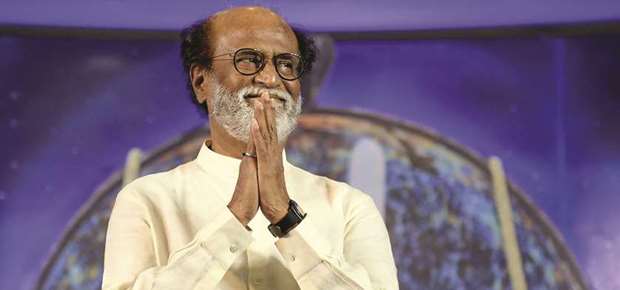After years of keeping himself and his hundreds of thousands of fans in sheer suspense, the Tamil superstar Rajinikanth – whose popularity, though not his acting skills, is arguably greater than the other Tamil superstar, Kamal Haasan – announced in Chennai on the very last day of 2017 that he would enter the political arena and flout a brand new party.
Rajinikanth said that if he did not get into politics now – a time when Jayalalithaa’s death in December 2016 had left an administrative vacuum in Tamil Nadu, where she was the Chief Minister, heading the All-India Anna Dravida Munnetra Kazhagam (AIADMK) – he would feel awfully guilty. Cheered by his frenzied fans, the 67-year-old actor averred: “I will come into politics. I will do my duty by forming a new party. Over the past one year, the events in Tamil Nadu have put the state to shame. People are laughing. If I don’t make this decision now, the guilt will haunt me.”
Rajinikanth explained a couple of things about his decision: “My party will contest all 234 seats of the state in the next assembly elections. Everything needs to change, the time is here. We will change the system. I want to bring good governance,” he told his supporters at Chennai’s Raghavendra Mandapam. In fact, he said that the chief minister’s post was offered to him a long time ago when he was in his forties. It was too early to sit on that chair then. He also added that his party would not have cadres, but watchdogs, and “I will head these watchdogs”.
However, he made no attempt to spell out what the policies of his party would be – a point that the ruling AIADMK has already begun to capitalise on. Added to this, Rajinikanth asked his admirers to support the Dravida Munnetra Kazhagam (DMK) – the main opposition party in Tamil Nadu today headed by the legendary M K Karunanidhi, happy now that his favourite daughter and Member of Parliament, Kanimozhi, had been acquitted in the 2G scam, but perhaps a little upset as well at having lost a by-poll in Chennai to TTV Dinakaran, part of the sidelined Sasikala faction of the AIADMK.
All this makes the political alignment somewhat lucid. For several months now, the talk in Chennai has centred around the Bharatiya Janata Party (BJP) hoping to find a foothold in Tamil Nadu with the help of a local political party. It is quite possible that with the AIADMK in a near ruinous state with factional feuds taking over, and with the DMK, also facing some kind of rift between Karunanidhi’s two sons, Stalin and Azhagiri, the BJP might find a pliable ally in Rajinikanth.
But this power equation can change if Kamal Haasan, another Tamil superstar, also announces a political party – as he has been promising.
In any case, the moot point now is, can a big showman like Rajinikanth or a versatile actor like Haasan turn into an effective and able administrator? It is one thing wooing the viewer in darkened auditoriums with their magical gimmicks or heroic acts, but quite another thing to lead a political party with tens of Ministers, hundreds of cadres and in a state like Tamil Nadu rife with a thousand problems, so to say.
In fact, the world over there has been a rethink on actors holding political positions. The Guardian headlined a question in a recent opinion piece “Should actors be political?” And the article begins: “Actor Martin Freeman, who doesn’t lack socialist chops, says that, unlike his Sherlock co-star, Benedict Cumberbatch, he doesn’t think that it’s a good idea for actors to hold forth on politics. ‘It’s deeply annoying to have someone like me, who doesn’t know everything, bang on’, says Freeman. ‘Actors can be pompous and we can overestimate our importance’.”
Indeed so. Actors can be pompous, shorn of humility. Once, a lot of eyebrows were raised when even elderly and senior ministers prostrated before Jayalalithaa. The other day, we saw fans doing the same even as Rajinikanth said one should fall only at the feet of parents.
In Tamil Nadu, where hero-worship is taken to a ridiculous extreme, a cinema star becomes divine with a halo placed firmly around his head. And a superstar like Rajinikanth gets a kind of adulation that will surprise and shock an outsider – who might well lambast this as downright slavishness. Or, call it rank feudalism.
Interestingly, this kind of star worship is now confined to Tamil Nadu. Gone are the days when an NT Rama Rao or a Raj Kumar (both were actors) held this kind of sway in neighbouring states like Andhra Pradesh and Karnataka. Rao first achieved popularity on screen and later his roles helped him attract the electorate – which imagined him to be the very avatar of godliness.
Tamil Nadu politic has always had a strong relationship with cinema – with people like Annadurai, Karunanidhi, M G Ramachandran and Jayalalithaa all having risen from the tinsel world. Karunanidhi was a brilliant writer, and Ramachandran was a hugely popular actor who enacted all that was penned. Karunanidhi and Ramachandran helped carry the Dravidian philosophy (out of which the DMK and the AIADMK emerged) to the masses.
Nonetheless, let us not forget these men had a long tryst with a political ideology they created – and which they strengthened via the silver screen. Stars like Haasan and Rajinikanth have no ideology to speak about or even a concrete plan to push themselves into the hallowed premises of the State Assembly. Herein lies the crux of the challenge.
* Gautaman Bhaskaran has
been writing on Indian and world cinema
for close to four decades, and may be e-mailed at [email protected]

POLITICIAN: Tamil cinema superstar says he will form his own political party.
